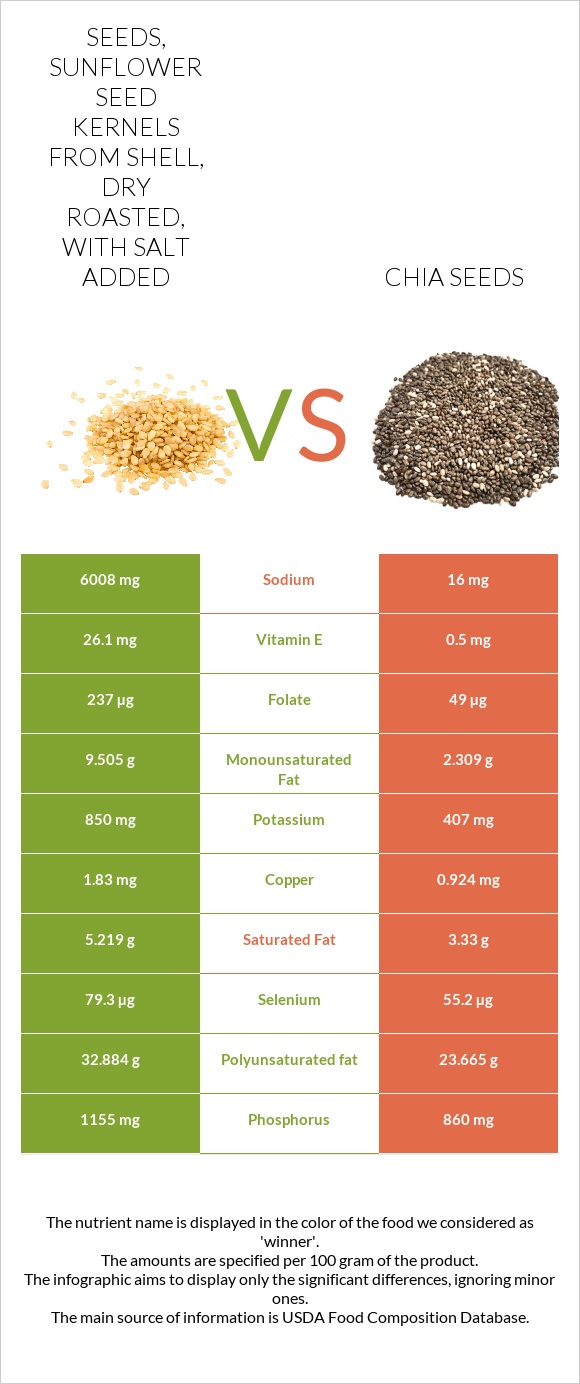Seeds, sunflower seed kernels from shell, dry roasted, with salt added vs. Chia seeds — In-Depth Nutrition Comparison
Compare
Important differences between seeds, sunflower seed kernels from shell, dry roasted, with salt added and chia seeds
- Seeds, sunflower seed kernels from shell, dry roasted, with salt added has more vitamin E, copper, folate, and selenium; however, chia seeds have more fiber, calcium, magnesium, iron, and vitamin B1.
- Seeds, sunflower seed kernels from shell, dry roasted, with salt added's daily need coverage for sodium is 261% more.
- Seeds, sunflower seed kernels from shell, dry roasted, with salt added has 52 times more vitamin E than chia seeds. Seeds, sunflower seed kernels from shell, dry roasted, with salt added has 26.1mg of vitamin E, while chia seeds have 0.5mg.
- Chia seeds are lower in sodium.
The food varieties used in the comparison are Seeds, sunflower seed kernels from shell, dry roasted, with salt added and Seeds, chia seeds, dried.
Infographic

Infographic link
Mineral Comparison
Mineral comparison score is based on the number of minerals by which one or the other food is richer. The "coverage" charts below show how much of the daily needs can be covered by 300 grams of the food.
| Contains more PotassiumPotassium | +108.8% |
| Contains more CopperCopper | +98.1% |
| Contains more ZincZinc | +15.5% |
| Contains more PhosphorusPhosphorus | +34.3% |
| Contains more SeleniumSelenium | +43.7% |
| Contains more MagnesiumMagnesium | +159.7% |
| Contains more CalciumCalcium | +801.4% |
| Contains more IronIron | +103.2% |
| Contains less SodiumSodium | -99.7% |
| Contains more ManganeseManganese | +29.1% |
Vitamin Comparison
Vitamin comparison score is based on the number of vitamins by which one or the other food is richer. The "coverage" charts below show how much of the daily needs can be covered by 300 grams of the food.
| Contains more Vitamin EVitamin E | +5120% |
| Contains more Vitamin B2Vitamin B2 | +44.7% |
| Contains more Vitamin B5Vitamin B5 | +∞% |
| Contains more Vitamin B6Vitamin B6 | +∞% |
| Contains more Vitamin KVitamin K | +∞% |
| Contains more FolateFolate | +383.7% |
| Contains more Vitamin CVitamin C | +14.3% |
| Contains more Vitamin B1Vitamin B1 | +484.9% |
| Contains more Vitamin B3Vitamin B3 | +25.4% |
All nutrients comparison - raw data values
| Nutrient |  |
 |
DV% diff. |
| Sodium | 6008mg | 16mg | 261% |
| Vitamin E | 26.1mg | 0.5mg | 171% |
| Vitamin B5 | 7.042mg | 141% | |
| Fiber | 9g | 34.4g | 102% |
| Copper | 1.83mg | 0.924mg | 101% |
| Vitamin B6 | 0.804mg | 62% | |
| Polyunsaturated fat | 32.884g | 23.665g | 61% |
| Calcium | 70mg | 631mg | 56% |
| Magnesium | 129mg | 335mg | 49% |
| Iron | 3.8mg | 7.72mg | 49% |
| Folate | 237µg | 49µg | 47% |
| Selenium | 79.3µg | 55.2µg | 44% |
| Vitamin B1 | 0.106mg | 0.62mg | 43% |
| Phosphorus | 1155mg | 860mg | 42% |
| Fats | 49.8g | 30.74g | 29% |
| Manganese | 2.11mg | 2.723mg | 27% |
| Monounsaturated fat | 9.505g | 2.309g | 18% |
| Potassium | 850mg | 407mg | 13% |
| Vitamin B3 | 7.042mg | 8.83mg | 11% |
| Choline | 55.1mg | 10% | |
| Carbs | 15.31g | 42.12g | 9% |
| Saturated fat | 5.219g | 3.33g | 9% |
| Protein | 19.33g | 16.54g | 6% |
| Zinc | 5.29mg | 4.58mg | 6% |
| Vitamin B2 | 0.246mg | 0.17mg | 6% |
| Calories | 546kcal | 486kcal | 3% |
| Vitamin K | 2.7µg | 2% | |
| Vitamin C | 1.4mg | 1.6mg | 0% |
| Net carbs | 6.31g | 7.72g | N/A |
| Sugar | 2.73g | N/A | |
| Trans fat | 0.14g | N/A | |
| Tryptophan | 0.295mg | 0.436mg | 0% |
| Threonine | 0.788mg | 0.709mg | 0% |
| Isoleucine | 0.967mg | 0.801mg | 0% |
| Leucine | 1.408mg | 1.371mg | 0% |
| Lysine | 0.795mg | 0.97mg | 0% |
| Methionine | 0.42mg | 0.588mg | 0% |
| Phenylalanine | 0.992mg | 1.016mg | 0% |
| Valine | 1.116mg | 0.95mg | 0% |
| Histidine | 0.536mg | 0.531mg | 0% |
| Omega-3 - ALA | 17.83g | N/A | |
| Omega-6 - Linoleic acid | 5.835g | N/A |
Macronutrient Comparison
Macronutrient breakdown side-by-side comparison
Protein:
19.33 g
Fats:
49.8 g
Carbs:
15.31 g
Water:
1.2 g
Other:
14.36 g
Protein:
16.54 g
Fats:
30.74 g
Carbs:
42.12 g
Water:
5.8 g
Other:
4.8 g
| Contains more ProteinProtein | +16.9% |
| Contains more FatsFats | +62% |
| Contains more OtherOther | +199.2% |
| Contains more CarbsCarbs | +175.1% |
| Contains more WaterWater | +383.3% |
Fat Type Comparison
Fat type breakdown side-by-side comparison
Saturated fat:
Sat. Fat
5.219 g
Monounsaturated fat:
Mono. Fat
9.505 g
Polyunsaturated fat:
Poly. Fat
32.884 g
Saturated fat:
Sat. Fat
3.33 g
Monounsaturated fat:
Mono. Fat
2.309 g
Polyunsaturated fat:
Poly. Fat
23.665 g
| Contains more Mono. FatMonounsaturated fat | +311.7% |
| Contains more Poly. FatPolyunsaturated fat | +39% |
| Contains less Sat. FatSaturated fat | -36.2% |